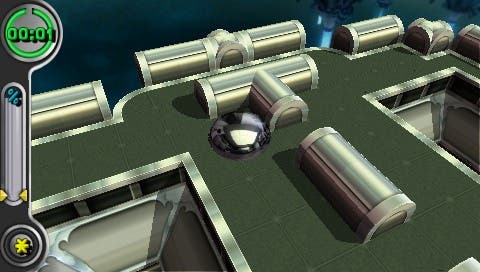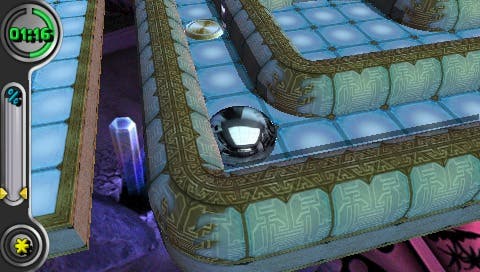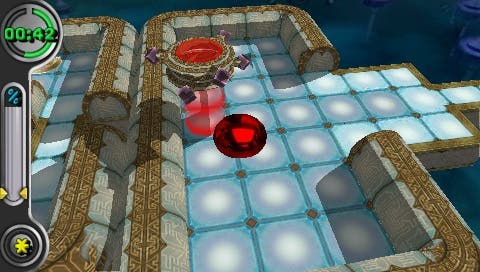Archer Maclean talks Mercury
Its esoteric charm, designing levels with hidden depths, and more.
Archer Maclean's Mercury has already captured the imagination of a lot of gamers. One of only two really new puzzle games on the PlayStation Portable, it's drawn comparisons to the likes of Super Monkey Ball and Marble Madness, but really belongs in a niche of its own. Having reviewed the game yesterday, today we chat to Archer Maclean himself about the game's influences, designing levels with so many hidden depths, the game's esoteric charm, and how the PSP is helping developers sidestep the "graphical arms war".

Mercury was originally inspired by those tilting puzzle games where you had to steer little metal balls around a maze. In fact, as some people will probably remember, there’s a mini-game based around them in Cueball World. Then we developed a ‘liquid metal physics’ prototype engine and we had one of those “hold on a minute” moments and one thing led to another. We’ve certainly looked at both Marble Madness and SMB but Mercury is actually a very different game, there’s a much heavier puzzle element involved and the characteristics of the blob itself give the game’s dynamics a very different feel. We all feel that The Blob is the star of the show!
It’s a combination of different things really. Some of it is deliberate design but the rest comes from extensive internal playtesting and tweaking of the levels. Often we’d notice that you could almost shave off time to complete a level by doing certain things and it was just a question of tweaking the level to allow these shortcuts to be used. You have to remember that what may seem like quite a basic level in Mercury was revised and tweaked over and over again internally to make these shortcuts appear to be almost accidental. Having said that of course it was, occasionally, just blind luck!

I’m not sure if it’s a bad thing for your game to be considered “too esoteric” when lined up next to today’s ceaseless avalanche of mediocre sequels and me-too games. Of course you want your game to appeal to as broad a cross-section of players as possible but, like the man said, you can’t please all of the people... I think that these days more and more games seem to be sold on the basis of the number of features in the game, more cars, more weapons, more characters etc. rather than whether or not the basic play dynamic is actually any good. That’s because it’s very easy to lose sight of that core simplicity when you’re part of a hundred man team working on a cinematic behemoth of a game! Yes, Mercury has simplicity at its heart but personally I think that’s part of its appeal. We can focus on exploiting that simplicity and surprising the player with the ways in which we can constantly build upon and expand it. Remember that Tetris didn’t become popular on the back of a global marketing campaign, it was strong core gameplay and good word of mouth and spawned a million me too sequels. Besides, imagine trying to sell a 2D game with one level to a publisher these days!
We’ve always aimed to have Mercury ready for hardware launch but the game was in development before the PSP was announced so there was an element of “right place, right time” to it as well. The PSP is an ideal format for the game though and it would be much harder to sell the game into the much more crowded market that exists for the home formats. My hope is that with Mercury being one of the only puzzle games on PSP we will get the game in front of more players and that word of mouth will do the rest.

I don’t know if we will get past that, I just think that there will be an “indie” stream of game development in the future which will produce games that appeal to a more limited section of the audience. Just as with movies and music these games will still be able to break into the mainstream and achieve mass appeal but it will have to be without the colossal marketing spend of a FIFA or Halo.
It's easy to say that you could fund 10 new game types for the marketing spend on something like FIFA alone.
Unfortunately we’re in a position now where the mass-market increasingly expects the inflated production values that you find in these big games and small developers are simply unable to compete on that playing field. It’ll only get worse with the next-generation of hardware too.
Stagnation and eventual consumer apathy. The constant raising of the production values bar doesn’t help anybody in the long run, it’ll just mean fewer developers and therefore fewer ideas, as well as fewer publishers willing to risk ever rising development budgets on new genres when instead they can stick with lower risk known-formulas like racing and fighting games!
It’s no accident that so many developers have leapt at the chance to develop on PSP, where the emphasis will be more on the gameplay and less on the graphical arms war. I think Mercury’s a perfect example of the way in which we’ve got to think laterally about development these days. We’ve got to aim to expose players to new experiences and gameplay and not just give them more of the same with slightly prettier graphics.
Archer Maclean is head of Awesome Studios. His latest game, Mercury, is out now in the US for PlayStation Portable, and will be a launch title when the system appears in Europe.








